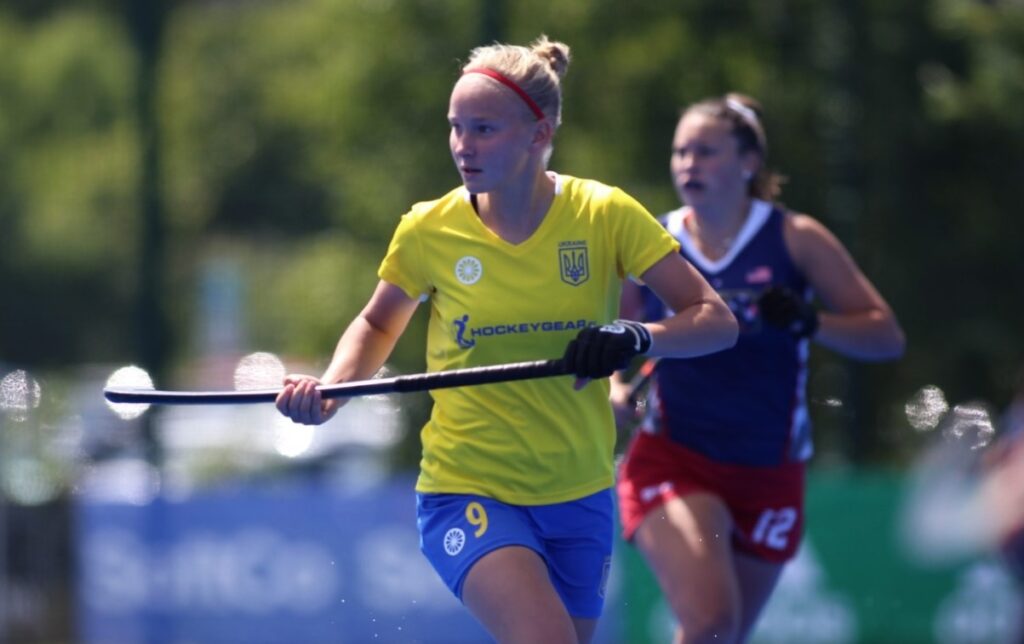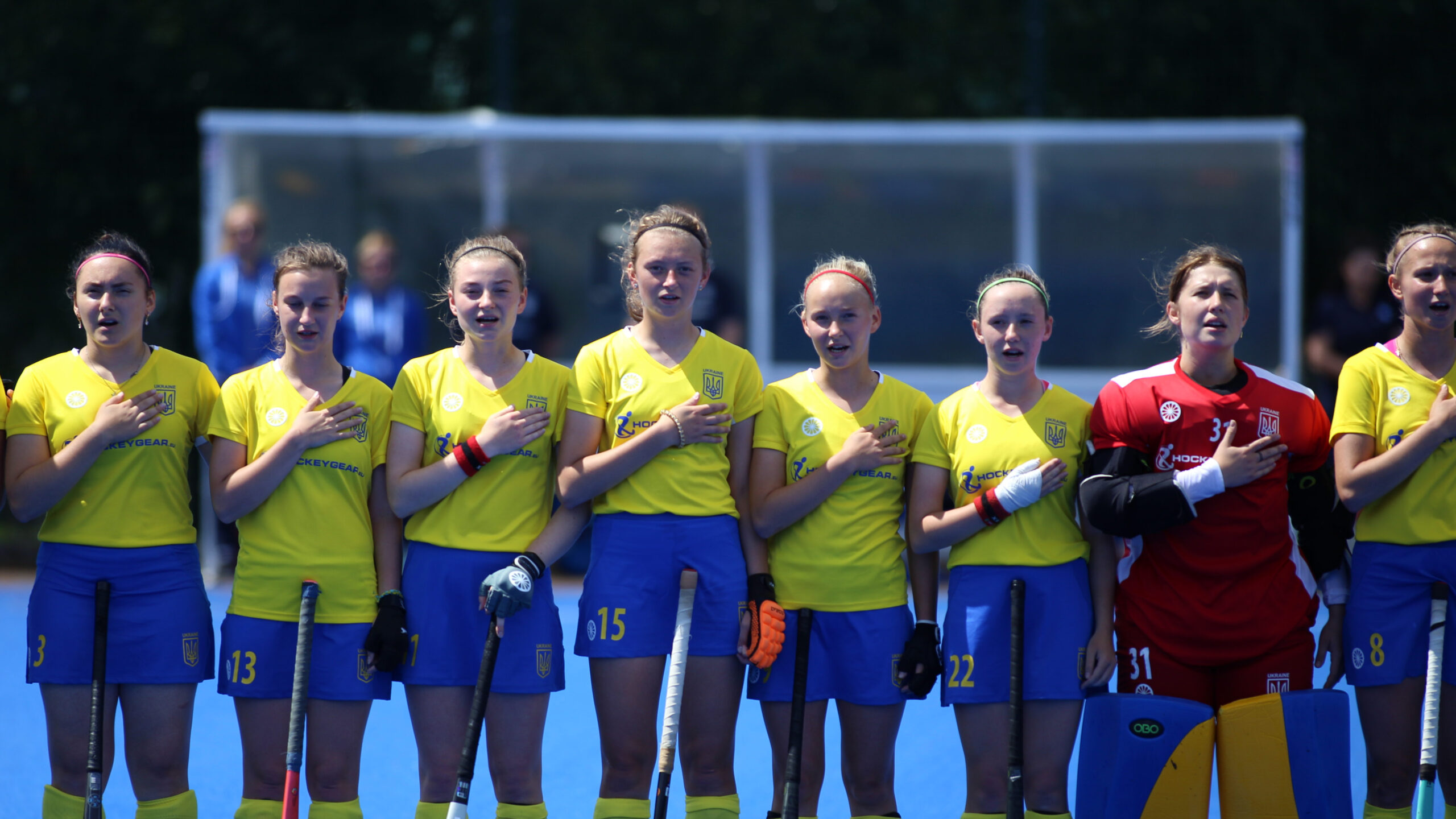Two and a half months later than hoped, the Irish women’s development squad were looking forward to taking the field with their Ukraine counterparts on Thursday night, writes Stephen Findlater.
It is part of the Uniphar Five Nations tournament which will also feature the Netherlands, USA and India in a high quality event at the Irish National Hockey Stadium and has been in action since last Sunday.
The tournament runs in parallel with the Irish senior women’s four-game, SoftCo series with Japan, their send-off fixtures before July’s World Cup.
It is an eye-catching array of fixtures featuring teams from around the world but it is the inclusion of Ukraine which the Junior Green Army were particularly keen to get in place.
The two nations were due to play each other on the opening day of the Junior World Cup in South Africa in April until the Russian invasion turned Ukrainian lives upside down.
Normality remains light years away but, through hockey and the hockey family, Maryna Horokhova says they can play a small part in bringing pride and belief to their people and country.
“The players are people fleeing a war first and then, second, sportspeople who know they can represent their country and have been given the responsibility and a chance to do so,” she said ahead of the tournament.
“Despite their troubles, fears, homesickness, they are aware they are not just simple hockey players. They are an international team and are growing up quickly, probably faster than they should.”
The rollercoaster began last December with the Covid-based decision to reschedule the FIH Junior World Cup. The schedule switch did not suit a number of other nations with Ukraine – the fifth reserve – approached to see if they could step up.
Money was tight but, for such a big opportunity, it could be found and they signed up in early February. A camp of 30 to 40 players was hastily assembled between the main clubs in Borispol and Sumy and visa applications were sent to Kiev.
And then came the war, stopping everything dead in its tracks. As quickly as the World Cup came into their conscience, those thoughts evaporated. Tanks rolled in and and surrounded the city of Sumy in the war’s early days; the hockey stadium in Borispol was closed down with the adjacent areas used for munitions supplies.
Singular focus was on evacuating who they could, hoping for what aid their contacts in the hockey community could come up with.
“We just thought, we are taking all our children abroad; please help us!” Horokhova explained as they mobilised as quickly as possible.
“For example, one [of the players] was sitting in an underground bomb shelter and five doors down a shell hit and 20 people were killed. She could have died – the windows in her house were blown out. Her family sent her the next day.”
It took four or five days to navigate the myriad checkpoints to the Polish border; one bus initially had 16 hockey players aboard but filled up as it went until they were able to cross with the Polish federation able to transport them on to their Olympic centre in Walcz.
Others linked up with them via their own routes, traversing Germany, the Czech Republic and so on, before the Dutch federation assisted their passage to Rotterdam.
In the end, about 20 girls – aged between 12 and 22 – made it that far where Victoria Hockey Club was able to house them in a converted underground changing room.
To get this far was a minor miracle but “it was never a long-term solution”.
“Some still had the feeling they were living in the bomb shelter with no windows. One of the 22-year-olds simply said it was not an option for me to stay here and I will quit the team – I am an adult and can go my own way.
“The coach understood but also did not want the team to be broken up. They would have no control over them if they went their separate ways but would still be responsible for their well-being.”
The FIH kept their Junior World Cup spot as long as they could. Eventually, they had to pull the plug as visas could not be complete – the requirement for signed parental consent, in many cases, was the sticking point.
Separated halfway across a continent from their parents, such admin was a bridge too far to arrange before the opening ceremony, particularly with South Africa requiring a higher age threshold for parental approvals.
Nonetheless, they were heartened by the show of support from their international colleagues
“The team manager was in contact with all the managers from the other World Cup nations. The likes of England and Ireland Under-21s were so supportive, asking: ‘what do you need? Sticks? Masks? Whatever you need, name it’.
“Hockey Ireland has helped us like crazy and Dave Passmore has done a hell of a job to help us.
“In the end, the only thing left was money – it’s more concrete and you need it. There were nice small initiatives like getting us SIM cards to make us more comfortable and welcome but it still came down to money which they are still trying to raise.
“People are trying their best but they feel so bad as Ukranians are proud people and find it difficult to even ask. Every person who gives one Euro is a hero; it keeps them having their dream alive.
“We can only be grateful but it still seems never enough and it will stop sometime. The problem is we don’t know when or how it ends. It is going over our heads – there is not enough time in the day to solve all the problems.”

It’s in that context Passmore was so keen to get Ukraine over to Ireland and the Junior Green Army’s sponsors and donors have played a key role.
The Irish Under-21 head coach said: “Having been due to play Ukraine in our first junior world cup match we were delighted they took up our invite to join us for this tournament.
“The Irish U21 players, staff and parents wanted to show our solidarity to Ukraine but we owe a great deal of gratitude to our sponsors Uniphar and our donor for making this happen. While competitors on the field, we hope to ensure our visitors find some time to enjoy our beautiful country and extend a hand of friendship off the field.”
How competitive they will be is a bit of an unknown. Since arriving in Rotterdam, Ukraine were able to train twice a day and pick up regular fixtures against local teams. This, however, is becoming trickier with the Dutch government ending free public transport for Ukrainians a fortnight ago.
They have moved to a Government protective facility, a repurposed office block where their troupe has swelled with the arrival of a couple of the players’ mothers.
“They are better off now being looked after by the Dutch government rather than a willing club who was happy to help but not prepared for the task with this volume of people. We are grateful for their help but it was overwhelming.
“For example, some of the team hadn’t seen as much of the war so initially felt it might be like a regular two-week camp in Belarus or Bulgaria. Only after a month, they started feeling a long way of home.
“We see different girls have different problems. Some are thinking of staying here; some want to go home despite the war; some are thinking about stopping hockey because it has lost the fun; some are thinking about university… not everybody will go back to Ukraine. For some, there is no reason to go back.”
They did also manage to travel to Turkey under the banner of TSOP Kolos Borispol for a European club tournament and they will contest the Under-21 EuroHockey Championship II in July.
Horokhova is keen to stress it was not “the Ukranian team” but “a Ukranian team”, one of circumstance for each individual with many of their more experienced players unable to link up with the side.
As such, she is realistic about what lies ahead when they come to Dublin and line out for these games, particularly against the Netherlands who could bring some Junior World Cup gold medalists.
“Coming to Ireland, they know they are playing the best in the world and it will be good for their development to help them get a good result in the European B division.
“They will get better players from it. Why is it important they keep playing? Hockey players – and sports people in general – are heroes; every achievement they have abroad is greeted by a lot of respect and memories.
“The Eurovision song contest gave such a proud feeling to the nation; we have a signed Ukranian flag by soldiers which travels everywhere with the team which reminds them what they are doing it for.”




